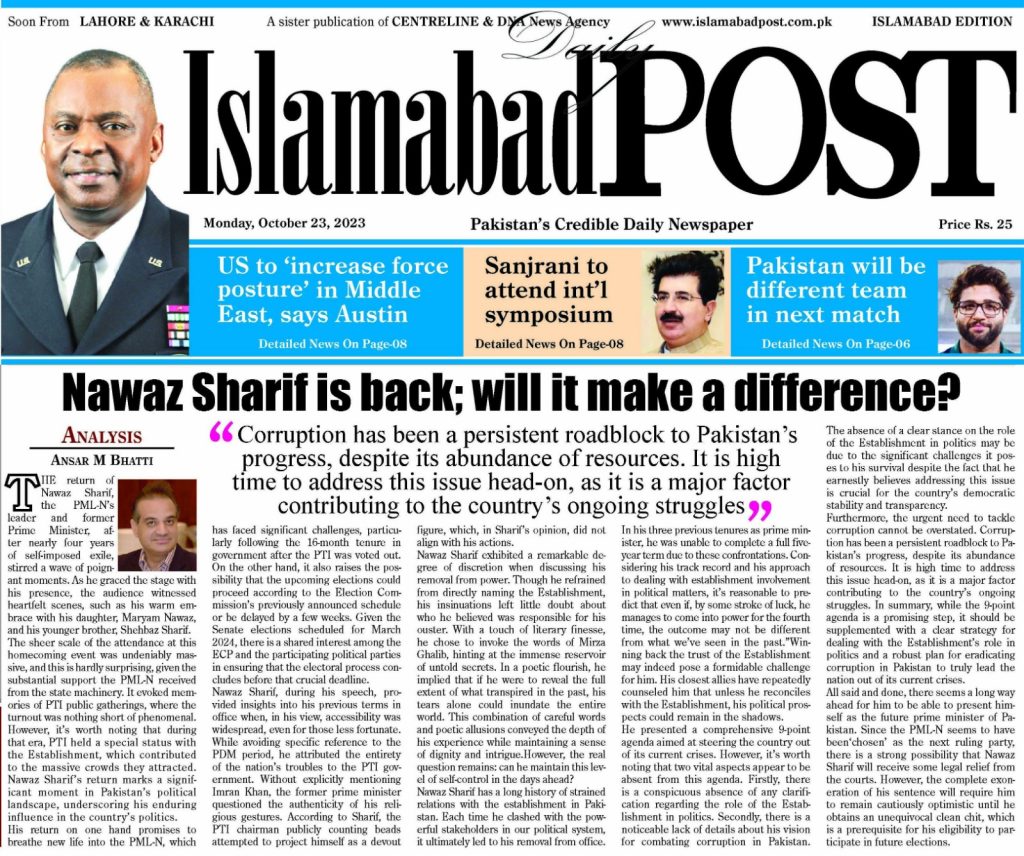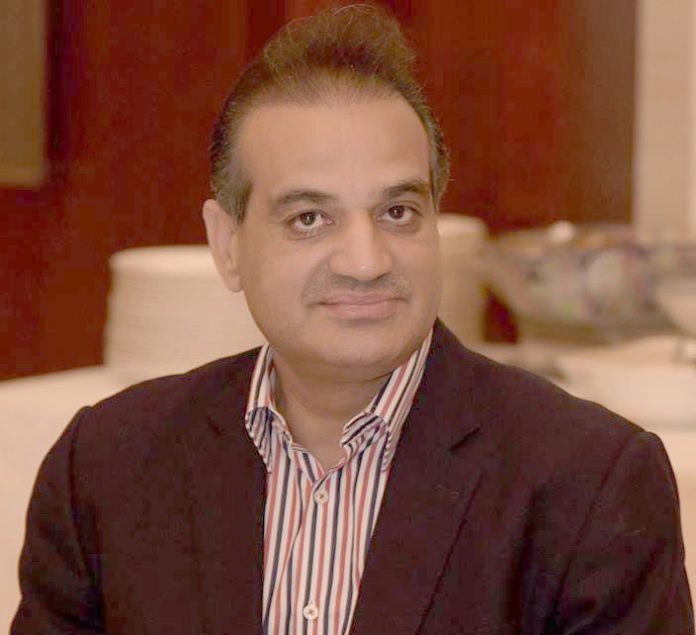Analysis
Ansar M Bhatti
The return of Nawaz Sharif, the PML-N’s leader and former Prime Minister, after nearly four years of self-imposed exile, stirred a wave of poignant moments. As he graced the stage with his presence, the audience witnessed heartfelt scenes, such as his warm embrace with his daughter, Maryam Nawaz, and his younger brother, Shehbaz Sharif.
The sheer scale of the attendance at this homecoming event was undeniably massive, and this is hardly surprising, given the substantial support the PML-N received from the state machinery. It evoked memories of PTI public gatherings, where the turnout was nothing short of phenomenal. However, it’s worth noting that during that era, PTI held a special status with the Establishment, which contributed to the massive crowds they attracted. Nawaz Sharif’s return marks a significant moment in Pakistan’s political landscape, underscoring his enduring influence in the country’s politics.
His return on one hand promises to breathe new life into the PML-N, which has faced significant challenges, particularly following the 16-month tenure in government after the PTI was voted out. On the other hand, it also raises the possibility that the upcoming elections could proceed according to the Election Commission’s previously announced schedule or be delayed by a few weeks. Given the Senate elections scheduled for March 2024, there is a shared interest among the ECP and the participating political parties in ensuring that the electoral process concludes before that crucial deadline.
Nawaz Sharif, during his speech, provided insights into his previous terms in office when, in his view, accessibility was widespread, even for those less fortunate. While avoiding specific reference to the PDM period, he attributed the entirety of the nation’s troubles to the PTI government. Without explicitly mentioning Imran Khan, the former prime minister questioned the authenticity of his religious gestures. According to Sharif, the PTI chairman publicly counting beads attempted to project himself as a devout figure, which, in Sharif’s opinion, did not align with his actions.
Nawaz Sharif exhibited a remarkable degree of discretion when discussing his removal from power. Though he refrained from directly naming the Establishment, his insinuations left little doubt about who he believed was responsible for his ouster. With a touch of literary finesse, he chose to invoke the words of Mirza Ghalib, hinting at the immense reservoir of untold secrets. In a poetic flourish, he implied that if he were to reveal the full extent of what transpired in the past, his tears alone could inundate the entire world. This combination of careful words and poetic allusions conveyed the depth of his experience while maintaining a sense of dignity and intrigue. However, the real question remains: can he maintain this level of self-control in the days ahead?
Nawaz Sharif has a long history of strained relations with the establishment in Pakistan. Each time he clashed with the powerful stakeholders in our political system, it ultimately led to his removal from office. In his three previous tenures as prime minister, he was unable to complete a full five-year term due to these confrontations. Considering his track record and his approach to dealing with establishment involvement in political matters, it’s reasonable to predict that even if, by some stroke of luck, he manages to come into power for the fourth time, the outcome may not be different from what we’ve seen in the past.” Winning back the trust of the Establishment may indeed pose a formidable challenge for him. His closest allies have repeatedly counseled him that unless he reconciles with the Establishment, his political prospects could remain in the shadows.
He presented a comprehensive 9-point agenda aimed at steering the country out of its current crises. However, it’s worth noting that two vital aspects appear to be absent from this agenda. Firstly, there is a conspicuous absence of any clarification regarding the role of the Establishment in politics. Secondly, there is a noticeable lack of details about his vision for combating corruption in Pakistan.
The absence of a clear stance on the role of the Establishment in politics may be due to the significant challenges it poses to his survival despite the fact that he earnestly believes addressing this issue is crucial for the country’s democratic stability and transparency.
Furthermore, the urgent need to tackle corruption cannot be overstated. Corruption has been a persistent roadblock to Pakistan’s progress, despite its abundance of resources. It is high time to address this issue head-on, as it is a major factor contributing to the country’s ongoing struggles. In summary, while the 9-point agenda is a promising step, it should be supplemented with a clear strategy for dealing with the Establishment’s role in politics and a robust plan for eradicating corruption in Pakistan to truly lead the nation out of its current crises.
All said and done, there seems a long way ahead for him to be able to present himself as the future prime minister of Pakistan. Since the PML-N seems to have been ‘chosen’ as the next ruling party, there is a strong possibility that Nawaz Sharif will receive some legal relief from the courts. However, the complete exoneration of his sentence will require him to remain cautiously optimistic until he obtains an unequivocal clean chit, which is a prerequisite for his eligibility to participate in coming elections.


















